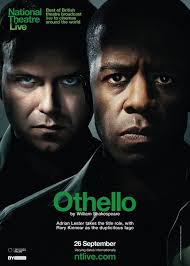England’s National Theatre has undertaken a project very, very dear to my heart: screening the very best NT productions, live, to cinemas worldwide! I’m very excited about this, and always feel butterflies in my stomach when I enter the Canadian movie theatre but hear the murmurs of the live audience at the National in London.
 Last week, I had the privilege of seeing National Theatre Live’s production of Othello, starring theatrical heavy-hitters Adrian Lester and Rory Kinnear, and directed by NT Artistic Director extraordinaire, Nicholas Hytner. The result was outstanding. Before the play, emcee Emma Freud interviewed Hytner about his dramatic vision, and he explained that Shakespeare’s Venice, in which the text begins, is not culturally important in itself as much as it’s a byword for bustling commercial centre. To Hytner, the play could just as easily begin in central London, which we see in the when the play begins with Iago and Roderigo shooting the shit on a set made to look like a generic English pub. Kinnear puts on a working-class accent, which helps us understand why Iago is so frustrated when Othello chooses the young, Cassio over himself for the post of second-in-command, even though Iago is an experienced officer and Cassio has “never set a squadron in the field.”
Last week, I had the privilege of seeing National Theatre Live’s production of Othello, starring theatrical heavy-hitters Adrian Lester and Rory Kinnear, and directed by NT Artistic Director extraordinaire, Nicholas Hytner. The result was outstanding. Before the play, emcee Emma Freud interviewed Hytner about his dramatic vision, and he explained that Shakespeare’s Venice, in which the text begins, is not culturally important in itself as much as it’s a byword for bustling commercial centre. To Hytner, the play could just as easily begin in central London, which we see in the when the play begins with Iago and Roderigo shooting the shit on a set made to look like a generic English pub. Kinnear puts on a working-class accent, which helps us understand why Iago is so frustrated when Othello chooses the young, Cassio over himself for the post of second-in-command, even though Iago is an experienced officer and Cassio has “never set a squadron in the field.”
This play revolves around the theme of truth, the tales people tell, and what listeners trust as truth. Lester appears onstage as Othello, and instantly I trusted him as leader of the Venetian military. Why did he deserve my trust? It probably had a lot to do with the fact that Lester looks a lot like another “O”, Barack Obama! He’s handsome, but his graying temples only add to his sexual allure; we can see why Desdemona is so attracted to him, despite the age difference. Hytner doesn’t overdo the Obama parallels, but when Lester sits at the head of a boardroom table with reading classes on, I can see how Othello claims the respect of his fellow statesmen.
When Desdemona’s father storms into the war council after finding out that she’s eloped with the Moor, Othello welcomes Brabantio’s rebukes with an offer to tell the “round unvarnish’d tale” of his courtship with Desdemona. By saying “unvarnish’d”, Shakespeare calls up the black/white imagery that haunts the play, and shows that these colours extend beyond questions of race to questions of morality and truth. When he says that his tale will be “unvarnish’d”, Othello means that his story will be one of truth, dignity, and propriety. He wins over the council, and Brabantio storms off, warning the Moor that “She has deceived her father, and may thee,” the first of many foreshadowings of the couple’s ultimate doom.
 Soon after a plan is devised for the military to head to Cyprus, Iago reveals his plan to drive Othello mad with jealousy. Critics like Samuel Taylor Coleridge believe that Iago is a villain of “motiveless malignity” – that he doesn’t have a reason to wreak emotional havoc. I disagree. His first motive is being overlooked for promotion. He tells us of the second during one of his many soliloquies (speeches made alone onstage, directed to the audience):
Soon after a plan is devised for the military to head to Cyprus, Iago reveals his plan to drive Othello mad with jealousy. Critics like Samuel Taylor Coleridge believe that Iago is a villain of “motiveless malignity” – that he doesn’t have a reason to wreak emotional havoc. I disagree. His first motive is being overlooked for promotion. He tells us of the second during one of his many soliloquies (speeches made alone onstage, directed to the audience):
I hate the Moor:
And it is thought abroad, that ‘twixt my sheets
He has done my office: I know not if’t be true;
But I, for mere suspicion in that kind,
Will do as if for surety.
Iago has heard rumours that Othello is sleeping with his wife; he doesn’t know the rumours to be true, but decides to take his revenge without of seeking official confirmation. Tales run rampant in this play, and the fatal flaw of almost every character is that they refuse to communicate directly with their spouse. Iago plans to cure his jealousy by fighting fire with fire: just as the rumours of Othello sleeping with his wife drive Iago mad with jealousy, so Iago will drive a rift between Othello and Desdemona. Iago plans to “put the Moor / At least into a jealousy so strong / That judgment cannot cure.”
While the war with the Turks that brought the Venetians to Cyprus ends almost before it even begins, Iago intends to fill their time in Cyprus with other types of fighting. First, Iago gets the recovering alcoholic Cassio drunk, and Cassio brawls with another commander. Othello is upset and disappointed when he finds out, and Cassio sees this moment as his own personal tragedy. He cries: “O, I have lost my reputation! I have lost the immortal part of myself, and what remains is bestial.” Like Othello, Cassio’s sense of self comes from a sense of duty, and the respect of those around him. Without his title, Cassio is left with the shame of his indiscretion and calls himself “bestial”, driven by his animal spirits and the opposite of his best, most civilized self.
 Once Cassio is out of the Moor’s favour, Iago steals Desdemona’s handkerchief, a token of love from the Moor, and tells Othello that Desdemona betrayed him by giving the token to Cassio. The beauty of this production is that Iago’s moment of greatest triumph happens in a washroom! A washroom of all places! But it’s perfect: for once, washrooms aren’t just for places for women to gossip, but for men, once again, to shoot the shit! Othello attempts to take Iago’s words as nothing but idle washroom gossip, saying, “It is not words that shake me thus.” In moments, his words fall as flat as he does; Iago has tormented the Moor so far that falls into a seizure on the bathroom floor. Kicking his prostrate commander with his boot, Iago tells the audience:
Once Cassio is out of the Moor’s favour, Iago steals Desdemona’s handkerchief, a token of love from the Moor, and tells Othello that Desdemona betrayed him by giving the token to Cassio. The beauty of this production is that Iago’s moment of greatest triumph happens in a washroom! A washroom of all places! But it’s perfect: for once, washrooms aren’t just for places for women to gossip, but for men, once again, to shoot the shit! Othello attempts to take Iago’s words as nothing but idle washroom gossip, saying, “It is not words that shake me thus.” In moments, his words fall as flat as he does; Iago has tormented the Moor so far that falls into a seizure on the bathroom floor. Kicking his prostrate commander with his boot, Iago tells the audience:
The Moor already changes with my poison:
Dangerous conceits are, in their natures, poisons.
Which at the first are scarce found to distaste,
But with a little act upon the blood.
Burn like the mines of Sulphur.
In the past, I’ve heard critics make much of the “ocular proof” that Othello asks for to back up Iago’s claims of Desdemona’s infidelity. After seeing this production, I’m not convinced. Iago shows that Desdemona doesn’t even need to cheat on Othello: his words are all Iago needs to turn the Moor against his wife. Because everyone trusts him, calling him “Honest Iago”, Iago is able to spread his “poisonous” rumour and let it fester until Othello ultimately murders his wife.
Iago’s dark genius lies in his knowledge that Othello is just like him. As such, he knows that all Othello needs is to hear a rumour to make him unsure of his wife and unsettled in his rule as leader. If he can’t prevent his wife from cheating, if he can’t prevent his second in command from getting drunk, or sleeping in his wife, what can he do? Like Cassio who fears the “bestial” in himself, Othello tells us that without these cornerstones of his identity, “Chaos is come again.”
And chaos does, indeed, come to Cyprus. The council that had trusted Othello at the beginning of the play arrive on the scene to see Othello a fraction of the man he was: paranoid, inarticulate, and above all, violent to his wife. Hytner’s contemporary military backdrop at no point overshadows, but rather compliments this story, showing that although Shakespeare’s great tragedies tell tales on a national scale, the real tragedies are domestic.


